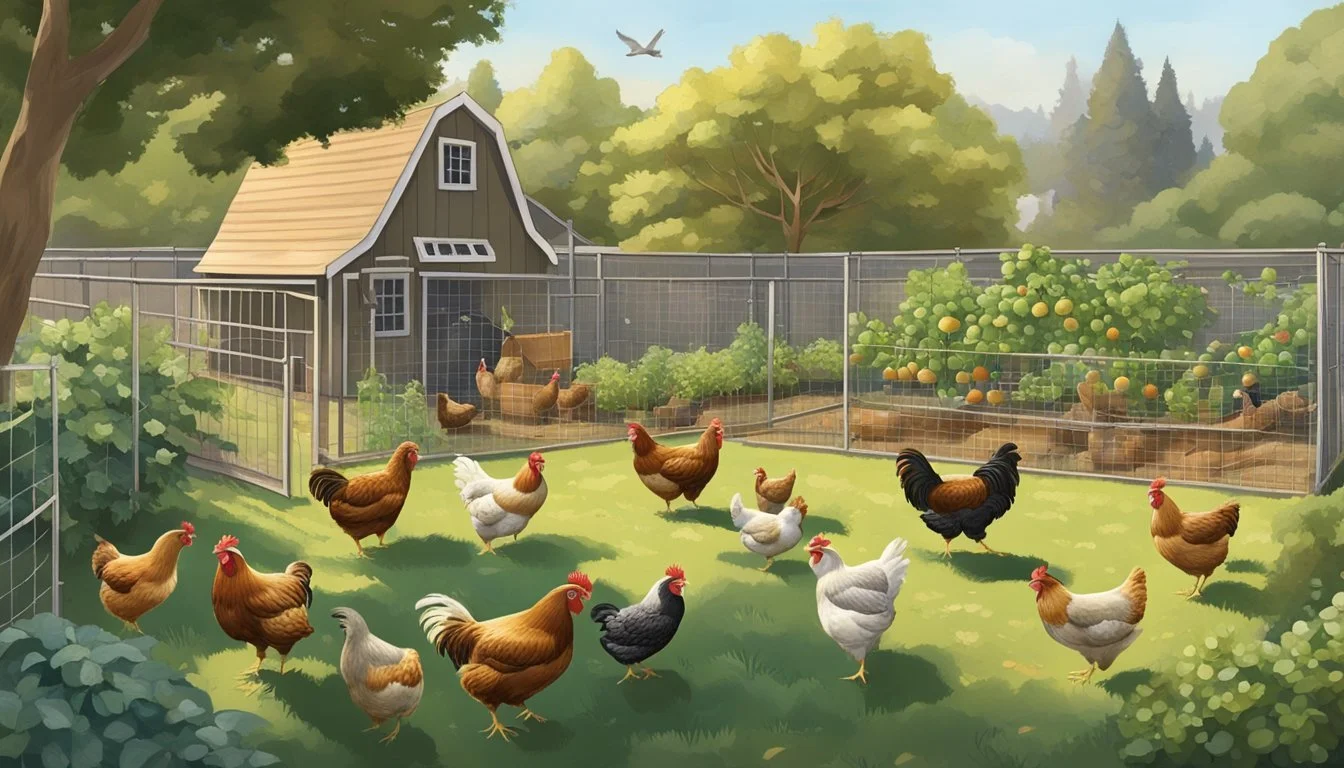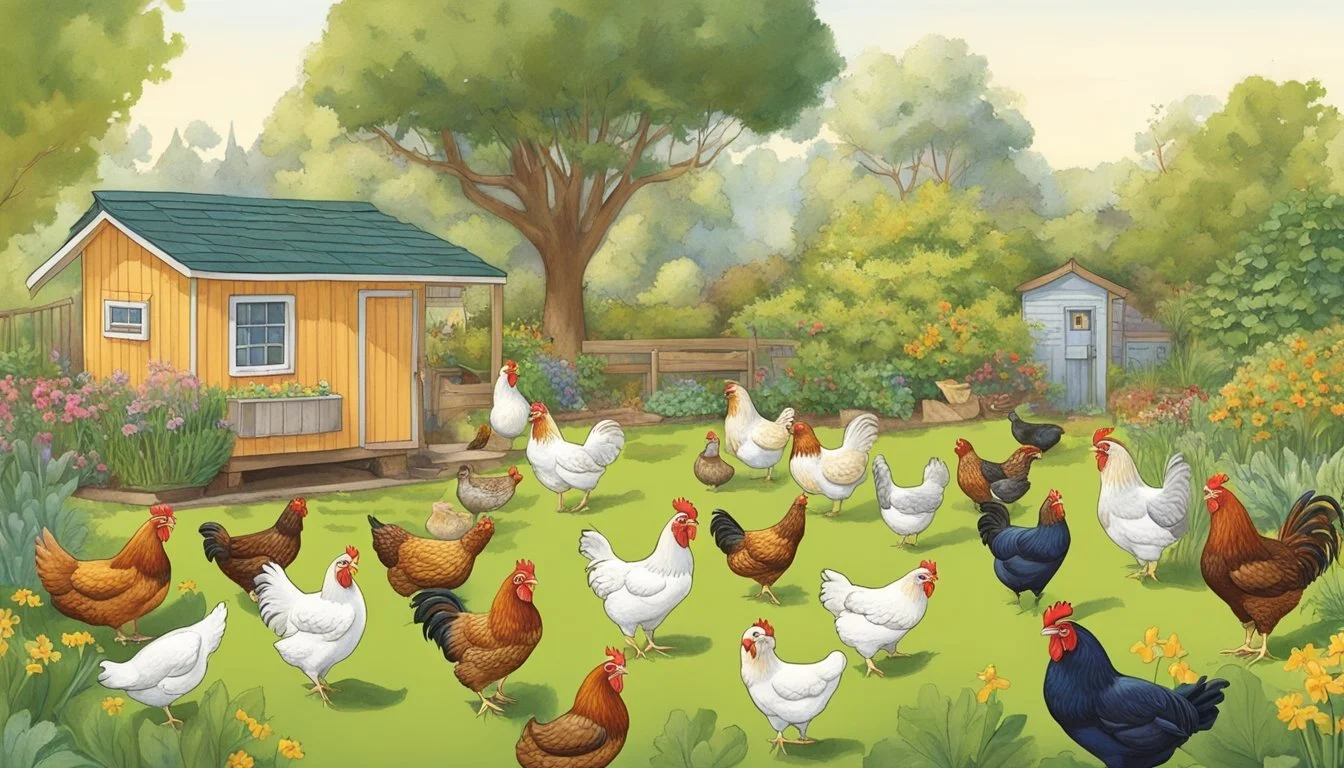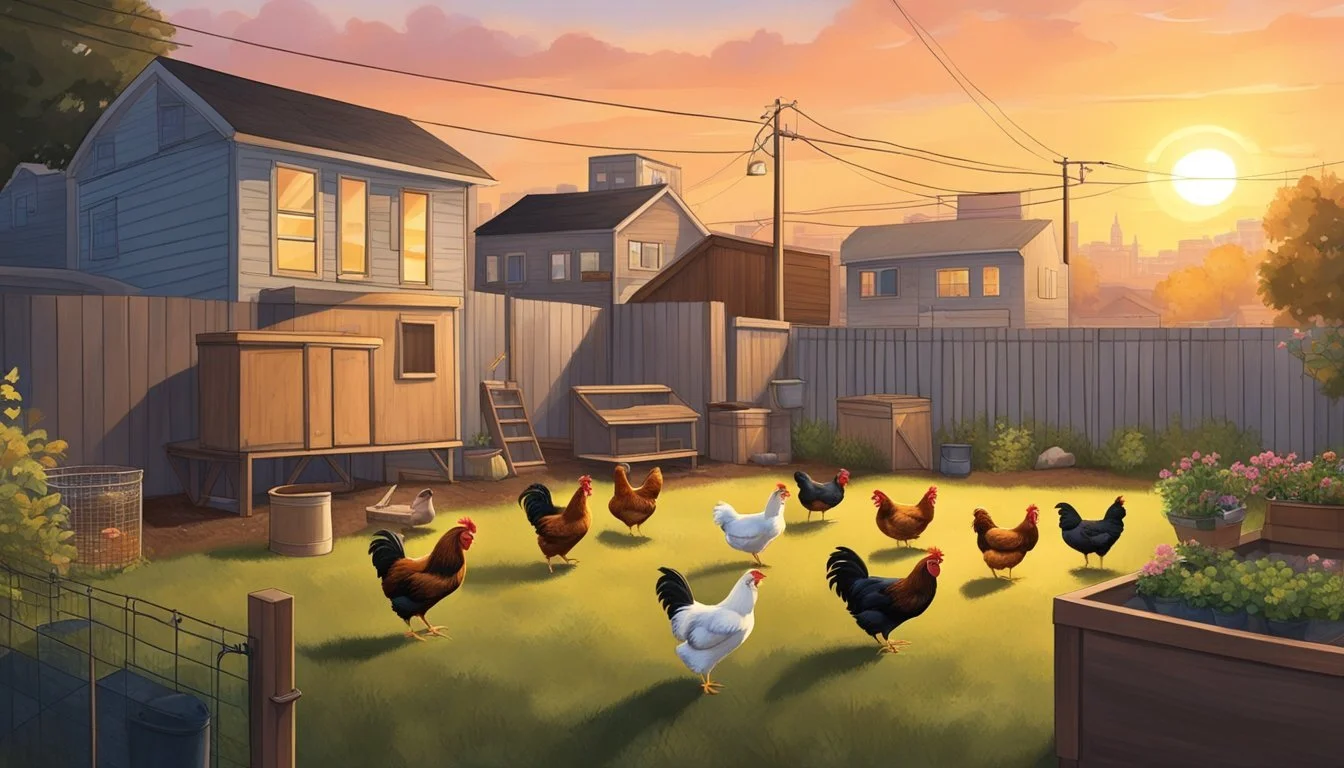Keeping Backyard Chickens in Oakland, CA
Essential Guidelines for Urban Poultry Farming
The urban agriculture movement in Oakland, California embraces the practice of raising backyard chickens, an undertaking that allows residents to enjoy fresh eggs, natural pest control, and the joys of caring for these birds. Oakland's mild climate is conducive to keeping chickens year-round, offering an eco-friendly option for residents to supplement their food sources and engage in sustainable living practices.
Residents looking to keep chickens in Oakland, however, must adhere to the city's specific regulations designed to maintain community health and safety. These rules permit homeowners to have an unlimited number of hens provided they follow proper health and safety guidelines, but they clearly prohibit the keeping of roosters to avoid noise complaints. In addition, coop placement and size are regulated to ensure the well-being of the chickens and to maintain the aesthetic of neighborhoods.
Gathering information is crucial for potential chicken keepers in Oakland. A good starting point is to consult local laws on websites dedicated to chicken regulations, but for the most accurate and up-to-date information, contacting local government officials, such as planning board members, county clerks or animal control representatives is recommended. This due diligence ensures that residents abide by the law while enjoying the benefits of backyard poultry.
Legal Considerations
Before starting a backyard chicken coop in Oakland, California, residents must familiarize themselves with local ordinances and understand any permitting processes required by the city. Compliance with these regulations is essential to legally raise chickens within city limits.
Understanding Local Ordinances
Local ordinances in Oakland allow residents to keep backyard chickens without a specific permit. However, there are important regulations to follow. Homeowners must comply with certain restrictions including the number of chickens allowed, which excludes roosters due to noise concerns. These restrictions are outlined in the Oakland Municipal Code and can vary, so it's crucial to review the most current regulations. Additionally, zoning laws must be checked as they might affect where a coop can be located on one's property.
Permitting Process
While Oakland does not require a permit for keeping backyard chickens, residents must ensure their coops adhere to health and safety ordinances. Municipalities may have specific requirements for the structure and placement of chicken coops to prevent any public health concerns. It is advisable for residents to verify there are no other permit requirements related to zoning or public safety that might affect their ability to keep chickens. Contacting the City Council or consulting the city's ordinance documents are recommended steps for homeowners to ensure compliance.
Chicken Husbandry
When keeping backyard chickens in Oakland, CA, one should choose appropriate breeds, provide proper feeding and nutrition, and ensure health with regular veterinary care.
Choosing the Right Breed
The climate in Oakland is favorable for a variety of chicken breeds. However, choosing the right breed involves considering factors such as temperament, egg production, and adaptability to backyard living. For instance, the Plymouth Rock and Orpington breeds are known for being friendly and hardy, suitable for urban environments.
Feeding and Nutrition
Chickens require a balanced diet that consists of proteins, carbohydrates, vitamins, and minerals.
Starter feed: For chicks aged 0-8 weeks, with 20-24% protein.
Grower feed: For chickens aged 8-18 weeks, with a reduced protein content of 16-18%.
Layer feed: For egg-laying hens, containing 16% protein and increased calcium.
Clean, fresh water must be accessible at all times to maintain their health.
Health and Veterinary Care
Chickens can be affected by various diseases and pests. Prevention is as important as treatment, and regular check-ups with a vet specializing in poultry are recommended. Key health considerations include:
Vaccination: Protects against common lethal diseases.
Parasite control: Regular inspection and treatment for lice, mites, and internal worms.
Disease monitoring: Observing for signs of respiratory diseases, digestive issues, or other common chicken ailments.
Maintaining clean coops and proper sanitation are critical to preventing health issues.
Coop Design and Maintenance
Designing an efficient coop and adhering to regular maintenance routines ensure the health and safety of backyard chickens. This section covers essential elements of coop design and effective strategies for sanitation and waste management.
Coop Requirements
The foundation of backyard chicken keeping is designing an enclosure that meets specific space and safety criteria. In Oakland, the coop must be well-ventilated to maintain air quality and comfortable temperatures. Each chicken requires at least four square feet of space inside the coop to prevent overcrowding, stress, and potential health issues. The coop placement is crucial; enclosures should be situated at least twenty feet away from any dwelling to comply with local regulations.
A coop needs to provide protection from predators, with robust fencing materials and secure latches. It should also be designed to keep chickens dry and safe from the elements.
Sanitation and Waste Management
Maintaining cleanliness is paramount for chicken coops to prevent disease and vermin infestations. Regular cleaning, at least once a week or bi-monthly, is recommended to manage waste and ensure the coop's sanitary conditions. The maintenance routine should include:
Removing waste: droppings and old bedding must be efficiently disposed of and replaced with fresh materials.
Disinfecting: use a safe disinfectant to clean waterers, feeders, and surfaces within the coop.
Effective waste management involves composting chicken manure or utilizing municipal waste services where appropriate. This not only maintains a clean environment but also recycles waste as a resource for gardening purposes.
Daily Management
Maintaining backyard chickens requires diligent daily management to ensure they are healthy and productive. Key responsibilities include routine care and the management of egg collection.
Routine Care
Chickens necessitate a consistent supply of food and water. Their diet should be balanced, typically consisting of a high-quality commercial feed supplemented with grains, vegetables, and occasional protein like mealworms. The chicken coop should be checked daily for cleanliness and dryness to prevent disease, and litter should be turned over or replaced regularly to maintain sanitation.
Feeding: Hold to a strict feeding schedule. Chickens benefit from feeding twice a day — morning and late afternoon.
Water: Ensure clean water is available at all times. Water containers must be cleaned regularly to avoid algae and bacteria buildup.
Health Check: Observe each chicken for signs of distress, illness, or injury.
Egg Collection and Use
Chicken owners should collect eggs every day. This minimizes the risk of the eggs getting dirty or damaged and discourages hens from developing broody behavior.
Collection Frequency: Once in the morning and once in the evening.
Egg Handling: Handle eggs with care, cleaning any dirt off gently to not remove the natural protective coating.
Egg production is influenced by factors such as daylight, so providing artificial light during shorter days can help maintain a steady supply of eggs.
Storage: It is generally recommended to store eggs at a consistent, cool temperature to preserve their freshness before use.
Community and Environmental Impact
Keeping backyard chickens in Oakland has nuanced implications on community relations and local sustainability efforts.
Neighbor Relations
In Oakland's residential areas, the presence of an urban chicken flock can affect neighbor relations. Compliance with local animal keeping regulations is crucial to maintain harmony. Residents who rear chickens in their backyards must consider noise, as roosters can cause disturbances, and odors from manure. Properly managed coops, regular clean up, and open communication with neighbors can help mitigate potential issues and improve the quality of life within the community.
Sustainability Practices
The environmental impact of backyard chickens in Oakland is significant in terms of sustainability. They contribute to composting efforts by providing manure that, when properly composted, enhances garden soil quality. Chickens can reduce waste by consuming kitchen scraps, lessening the organic waste directed to landfills. It's important to manage such practices responsibly to ensure the flock's health and minimize any negative ecological effects. Urban farmers in Oakland have the opportunity to foster sustainable living through these measures, thereby improving the overall quality of life.
Additional Considerations
When maintaining backyard chickens in Oakland, CA, one must consider both predator threats and adhere to state and local slaughter regulations. These factors are critical for the well-being of the chickens and compliance with the law.
Dealing with Predators
Backyard chickens can attract various predators, including raccoons, foxes, opossums, and hawks. The city of Oakland necessitates secure housing for chickens to thwart potential attacks. Chicken coops should have:
Sturdy walls and roofing: Protection from climbing and flying predators.
Wire mesh or hardware cloth: Covering all openings, with mesh small enough to prevent predators from reaching inside.
Locks and seals: Proper sealing of doors and entry points, especially at night.
Understanding Slaughter Regulations
Slaughtering chickens within Oakland falls under specific state and health regulations. Homeowners should familiarize themselves with the California Health and Safety Code, which governs the processing and handling of poultry. It is pertinent to note:
Slaughter location: Must be conducted in an area that adheres to sanitary conditions.
Disposal of remains: Remains must be disposed of properly to avoid health risks.
Code enforcement: Violation of slaughter regulations can result in fines or other penalties from local code enforcement.
Residents are advised to contact Oakland's local authorities for comprehensive codes and regulations related to backyard chicken slaughter to ensure they are in full compliance.
Resources and Support
For Oakland residents, raising backyard chickens can be supported by a wealth of local resources and educational materials. Residents should refer to the latest guidelines and take advantage of groups and materials designed to facilitate responsible chicken-keeping.
Local Support Groups
Oakland chicken enthusiasts can join local support groups where they can exchange information and receive guidance on chicken care. These groups often offer a platform for sharing best practices and provide a sense of community for backyard chicken keepers. Interested individuals may contact their local city clerk or refer to the community sections on websites like BackYard Chickens for the most current support groups in their area.
City Clerk Contact:
Phone: (510) 238-6620
Email: [email protected]
Oakland residents can also look for social media groups or neighborhood associations that focus on urban poultry, which often have frequent meet-ups and discussions.
Educational Materials
Educational materials are crucial for keeping chickens healthy and maintaining compliance with local regulations. Owners should regularly consult the latest guidelines for keeping fowl by reaching out to the relevant departments or accessing updated information online.
Where to find educational materials:
Local agricultural extensions
City or county animal services websites
Online Resources:
University of California Agriculture and Natural Resources
Poultry-specific websites like ChickenLaws.com
These resources often include sections dedicated to the basics of poultry husbandry, predator management, and other common issues. They should be used along with professional advice when needed and can greatly aid in the responsible and successful raising of backyard chickens.
Residents are also encouraged to check the last updated section of any online resource to ensure they are accessing the most recent information available.
Frequently Asked Questions
Can I keep chickens in my backyard in Oakland, CA? Yes, homeowners in Oakland, CA, are allowed to maintain an urban chicken flock as long as they adhere to health and safety regulations.
How many chickens can I have? There is no set limit on the number of chickens a homeowner can keep, provided they are hens and the property is maintained according to the city’s regulations.
Are roosters permitted in Oakland? No, roosters are prohibited within city limits to prevent noise disturbances.
Do I need a permit to keep backyard chickens? Oakland does not require a permit for keeping backyard chickens, but it's essential to ensure compliance with all city regulations related to animal care and property standards.
What rules exist for coop placement and size? Specific coop placement and dimensions are regulated to ensure the safety and welfare of the chickens as well as to minimize any potential nuisance to neighbors. These requirements are not specified here but can be found in the local ordinances.
Can I keep ducks or other fowl? The provided search results do not detail regulations for keeping ducks or other fowl. One should contact local animal control or refer to city ordinances for more information on other types of backyard poultry.
Who can I contact for more information? For further details or clarification, individuals should reach out to Oakland's animal control department or check the city's official website regarding urban chicken flock guidelines.
Appendix
In ensuring compliance with backyard chicken regulations in Oakland, residents may need to interact with local authorities or stay informed about any updates to legislation.
Contact Information for Local Authorities
Residents can reach out to the following entities for clarity on the rules or for any reporting purposes:
Oakland Planning Commission
Email: planning@oaklandca.gov
Phone: (510) 238-3941
Oakland Animal Control
Annual Permit Inquiries
Phone: (510) 535-5602
Oakland County Health Department
Email: health@acgov.org
Phone: (510) 267-8000
Updates and Amendments to Local Legislation
The latest legislative updates or amendments can be accessed through:
Official Website Links
Oakland Municipal Code: Chicken Regulations
Last Updated: Documentation on the website includes the last updated dates for reference.
It is advisable for residents to check these resources regularly or subscribe to updates to remain compliant with any new requirements or modifications to existing laws.











